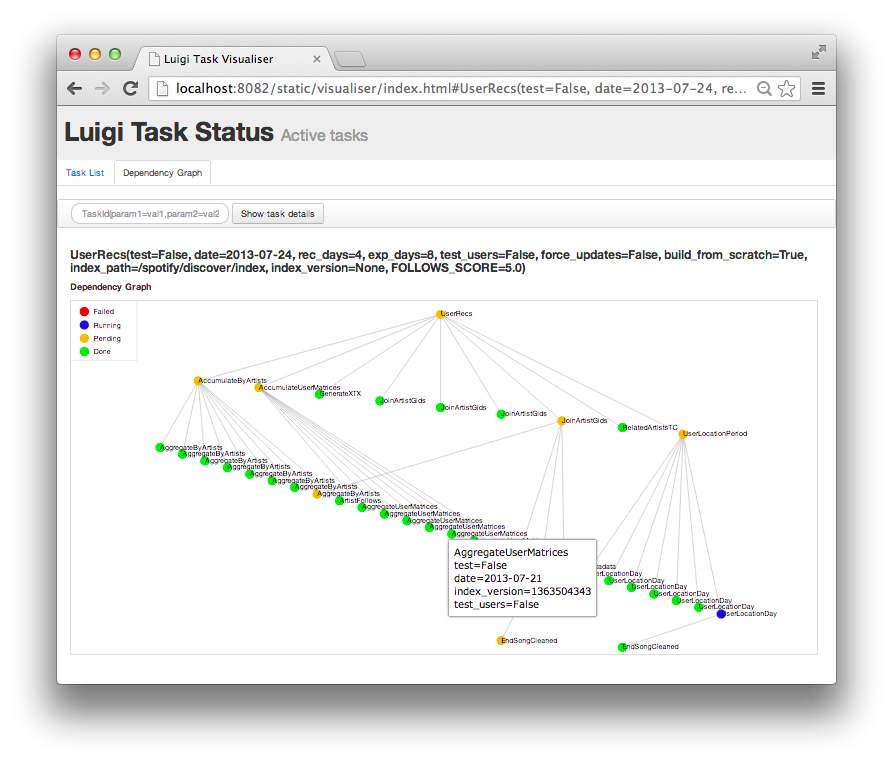Workflow mgmgt + task scheduling + dependency resolution
Project description
Note: For the latest source, discussion, etc, please visit the Github repository

About Luigi
Luigi is a Python package that helps you build complex pipelines of batch jobs. It handles dependency resolution, workflow management, visualization, handling failures, command line integration, and much more.
The purpose of Luigi is to address all the plumbing typically associated with long-running batch processes. You want to chain many tasks, automate them, and failures will happen. These tasks can be anything, but are typically long running things like Hadoop jobs, dumping data to/from databases, running machine learning algorithms, or anything else.
There are other software packages that focus on lower level aspects of data processing, like Hive, Pig, or Cascading. Luigi is not a framework to replace these. Instead it helps you stitch many tasks together, where each task can be a Hive query, a Hadoop job in Java, a Python snippet, dumping a table from a database, or anything else. It’s easy to build up long-running pipelines that comprise thousands of tasks and take days or weeks to complete. Luigi takes care of a lot of the workflow management so that you can focus on the tasks themselves and their dependencies.
You can build pretty much any task you want, but Luigi also comes with a toolbox of several common task templates that you use. It includes native Python support for running mapreduce jobs in Hadoop, as well as Pig and Jar jobs. It also comes with filesystem abstractions for HDFS and local files that ensures all file system operations are atomic. This is important because it means your data pipeline will not crash in a state containing partial data.
Luigi was built at Spotify, mainly by Erik Bernhardsson and Elias Freider, but many other people have contributed.
Dependency graph example
Just to give you an idea of what Luigi does, this is a screen shot from something we are running in production. Using Luigi’s visualizer, we get a nice visual overview of the dependency graph of the workflow. Each node represents a task which has to be run. Green tasks are already completed whereas yellow tasks are yet to be run. Most of these tasks are Hadoop jobs, but there are also some things that run locally and build up data files.

Background
We use Luigi internally at Spotify to run thousands of tasks every day, organized in complex dependency graphs. Most of these tasks are Hadoop jobs. Luigi provides an infrastructure that powers all kinds of stuff including recommendations, toplists, A/B test analysis, external reports, internal dashboards, etc. Luigi grew out of the realization that powerful abstractions for batch processing can help programmers focus on the most important bits and leave the rest (the boilerplate) to the framework.
Conceptually, Luigi is similar to GNU Make where you have certain tasks and these tasks in turn may have dependencies on other tasks. There are also some similarities to Oozie and Azkaban. One major difference is that Luigi is not just built specifically for Hadoop, and it’s easy to extend it with other kinds of tasks.
Everything in Luigi is in Python. Instead of XML configuration or similar external data files, the dependency graph is specified within Python. This makes it easy to build up complex dependency graphs of tasks, where the dependencies can involve date algebra or recursive references to other versions of the same task. However, the workflow can trigger things not in Python, such as running Pig scripts or scp’ing files.
Installing
Downloading and running python setup.py install should be enough. Note that you probably want Tornado. Also Mechanize is optional if you want to run Hadoop jobs since it makes debugging easier. See Configuration for how to configure Luigi.
Getting Started
The Luigi package documentation contains an overview of how to work with Luigi, including an Example workflow and an API overview which explains some of the most important concepts.
Getting Help
Find us on #luigi on freenode.
Subscribe to the luigi-user group and ask a question.
External links
Documentation (Read the Docs)
Mailing List (Google Groups)
Releases (PyPi)
Source code (Github)
Project details
Release history Release notifications | RSS feed
Download files
Download the file for your platform. If you're not sure which to choose, learn more about installing packages.
Source Distribution
File details
Details for the file luigi-1.0.14.tar.gz.
File metadata
- Download URL: luigi-1.0.14.tar.gz
- Upload date:
- Size: 277.4 kB
- Tags: Source
- Uploaded using Trusted Publishing? No
File hashes
| Algorithm | Hash digest | |
|---|---|---|
| SHA256 | 54a131fb0197191766829741846d12ddec6dafaa900029e9159e66812a09cb4e |
|
| MD5 | f9212f6cd1dc046739664b5bedcc3415 |
|
| BLAKE2b-256 | 317a697567f198c3187d329bd5239380595c18b1d4cec2100abb8683a5431449 |
























